Alternate Histories: Pavement: Brighten the Corners
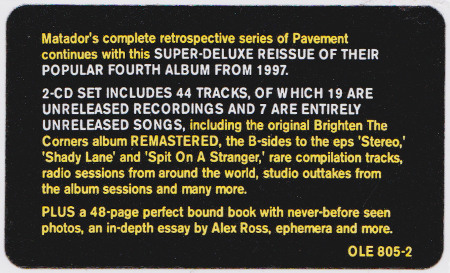
Pavement, Terror Twilight
Originally released 1997, reissued 2008 (Discogs) with 23 bonus tracks
The copious pictures found in the booklets for the deluxe editions of Pavement's first-fourth albums remind me of one meaning of the word, slack, in those days: truly not caring about what clothes you wear. As a man who has rarely given more than five minutes' thought or preparation to what I wear on any given day, I support but am nonetheless taken aback by the hideousness of some of the vintage Pavement fashions on display. They were the band's own kind of Punk gesture, I suppose. The veterans of Punk-Indie music, and the host of “subcultures” and “countercultures” that surrounded it, often cared a great deal about what they wore—and their tattoos, piercings, make-up—not merely to look good, to feel comfortable, to do what “your own thing” and “what I want,” which is all well and good. But also to signify: cultural meanings, social positions, on the “edge” or in the “liminal space” of something or other. Many of them still do, amazingly, in 2021, when any statement, posture, product (anything at all!) “comes out in the (white)wash” of the endless feed of audio-video drivel keeping us addicted to infotainment.
Is this another way of saying that some aspects of an artist's work get left behind, as relics to be studied at odd moments? Listen to the music. Then, later, when you can spare moments of braindead sublimity, ponder how such extraordinary Rock (yes, really, and clearly after all these years, deserving of the obsessive attention it received at the time) was made by guys who looked like stunt doubles from the atrocious sitcom Friends.
What else remains as a relic? Sadly, two tracks on Brighten the Corners, the two composed by Scott “Spiral Stairs” Kannberg, ‘Date With Ikea’ and ‘Passat Dream’. They simply do not fit. This is an an album, created a singular artistic unit, not a variety show, for heaven's sake. They don't even sound like they were recorded at the same place. Pavement fans have ignored this sad reality too long, especially since ‘Passat Dream’ is a great recording and good song (with bad lyrics). Perhaps the two tracks could have comprised a 45, the debut release of Kannberg's later project, Preston School of Industry. At one of those online-only publications (apparently no one want to say, “e-zine," anymore) that are utterly interchangeable (Tiny Mix Tapes, Stereogum, Pitchfork, No Ripchord) a recent investigative article disclosed the curious path by which an out-take from the Corners sessions, ‘Harness Your Hopes’, became the band's surprising hit song on an obscure online music-streaming service. ‘Hopes’ had been a fan favorite since its release. Another shorty ditty, ‘Roll with the Wind’ (like ‘Hopes’ a Corners out-take not released until two years later as a "B-side" track on the ‘Spit on a Stranger’ C. D. single), could have easily joined ‘Hopes' as the other missing piece replacing Kannberg's tunes.
Lest you think I am exaggerating this problem with Corners, or picking on Kannberg... Not at all. ‘Hit the Plane Down’, Kannberg's one song on Crooked Rain, fits (barely) into that album because another outlier, the Jazz-like instrumental, ‘5 - 4 = Unity’, makes the former not stand out so baldly. Together, they play a big role in setting the pace of that album's B side, which is circuitous and even disorienting compared to the tightly-wound A side. Kannberg's two songs on Wowee Zowee, meanwhile, blend in nicely with that album's eclectic and extensive selection of tunes.
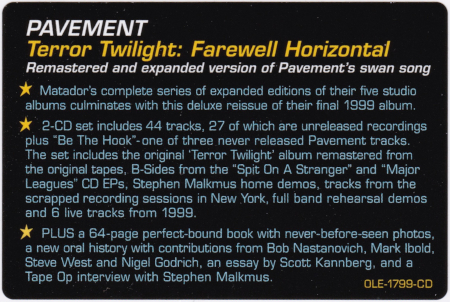
Pavement, Terror Twilight
Originally released 1999, reissued 2022 (Discogs) with 23 bonus tracks
By the way, Terror Twilight has been persistently dismissed since its release—since before its release. A few factors made this happen: a preview single, ‘Carrot Rope’, that does not sound much like the rest of the album; a producer, Nigel Godrich, with a penchant for adroit electronic manipulation of recorded sound (not exactly Pavement fans' favorite thing); and the growing number of Stephen Malkmus songs tending toward slower tempos and darker themes, already apparent on Corners. I admit I did not listen to the album when it came out. I had moved elsewhere in my listening. Four years later, driving to and from the Herbert Hoover Presidential Library in Iowa, it became a favorite. I cannot explain why. Something to do with the snow on the fields? Well, I can attempt to explain. I was a history graduate student, realizing that I had no clear reason for being so. There was a lot of Rock-and-Roll in those years clarion-calling me “home” (is there a requiste number of scare quotes to use here? “scare quotes”?) because one thing we learned in those days, since they were proposed to be “post-modern” (the Nineties! nevermind, Po-Mo was the Eighties) is that the lack of grand narratives turns into a grand narrative itself. One could argue that Stephen Malkmus, as a artist-public persona, learned that too. As such, his music made with the Jicks from 2001 onward may offer more pleasure or solace for him than his efforts with Pavement did. I would rather he have another great guitarist to play with. Also, the song lyrics on his solo albums too often tend to alternate between the gauche and the silly, at least beyond the post-Pavement afterglow of his eponymous debut. "Do your own thing."
–Justin J. Kaw, January 2021
On Second Note—Not Taking Things Seriously: Pavement: Wowee Zowee
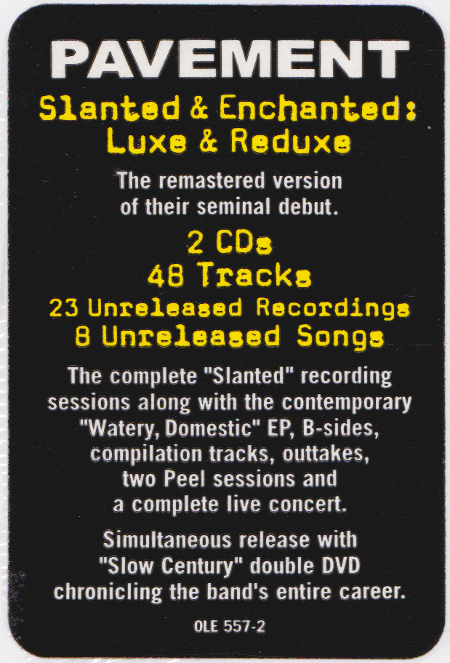
Pavement, Slanted and Enchanted
Originally released 1992, reissued 2002 (Discogs) with 34 bonus tracks
Frequently heralded (spoken by rote—received opinion—internet transmission) as the band's best, Pavement's debut album, Slanted and Enchanted [1992], may deserve that exalted place if it lost three tracks: ‘Conduit for Sale’, with its Fall-rip-off guitar riff (the best part), the sentimental ‘Here’, and the dumb ‘Two States’. Either way, Slanted serves as the main artifact of a quite-different band, with drummer Gary Young backing guitarists Stephen Malkmus and Scott Kannberg. Taking out three tracks from Slanted, cutting it down to 30 minutes in length, make seem drastic. Bear with me. A shorter album is nearly always better. The out-takes... don't worry, you'll hear them eventually, then meet fans trying to convince you they're genius. Every once in a while, an omitted track becomes the stuff of legend, the unjustly-overlooked gem: Fleetwood Mac's ‘Silver Spring’, omitted from Rumours, for example. These exceptions prove the rule. And examples of the rule in action are plentiful: Pavement's final album, Terror Twilight [1999], and the eponymous first Stephen Malkmus album could both lose a track, ‘Billie’ on the former, ‘Jenny and the Ess-Dog’ on the latter. This state of affairs, longer-album-itis, developed in the post-vinyl era, as cassettes, C. D.s, and the essentially-limitless length of downloads have convinced music artists, despite there being plenty of ways to release music, that they should stuff their major albums with an excess of material.
So what is the best Pavement album? Brighten the Corners [1997] needs only two misplaced Scott Kannberg-composed tracks removed—displaced—to make it the band's obvious culminating, essentially concluding, moment. With only 10 tracks, but still not as short as the proposed tuncated Slanted, it works well as the final refining of the band's sound after the menagerie of its predecessor, Wowee Zowee [1995]. If the bold, perhaps delirious, juxtapositions of styles and genres on Wowee suggest the playfulness of the band's approach to the serious practice of Rock, and the very-serious practice of Indie Rock, Brighten the Corners pairs that with a wider variety in its song lyrics, actually hinting at themes and stories of potential import to the reader. The contrast to the senseless wordsmithing that dominates Wowee was apparent with the first singles released to promote each album, ‘Stereo’ and ‘Rattled by the Rush’. The latter is such a perfect recording, with its Kannberg guitar work-out the listener never wants to end and a forceful, elemental beat-riff combination, that the words accompanying require no meaning, only their tactile character. All of the lyrics on that album are like this, save perhaps ‘Fight This Generation’. While there is enough humor in Malkmus' lyrics to make Brighten the Corners fit in with Pavement's overall approach, its—let's call it... blasé fair? I apologize; how about, arch whimsy?—undoubtedly the album's narrators have some definite frustrations, some clear concerns. Brooding, preoccupied, but still able to couch their fears in humor, as on ‘Embassy Row’. ‘Stereo’ is the silliest song on Brighten, yet still it offers some standard-Nineties "meta" commentary: the narrator acknowledges the joke lyrics, but argues that they get the job done: isn't he the one singing on your stereo? Very intellectual.
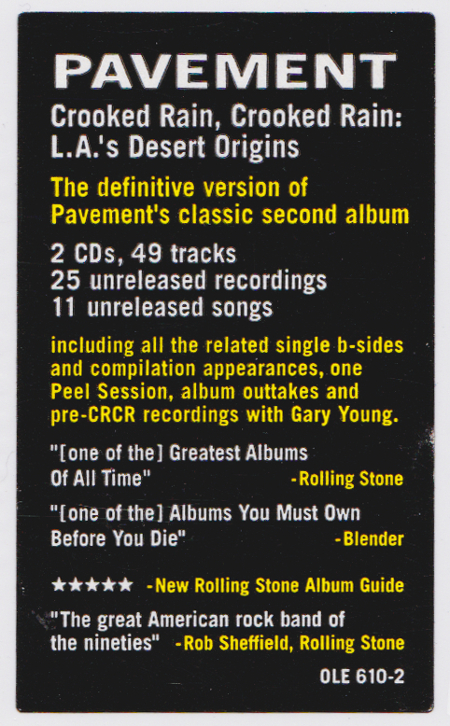
Pavement, Crooked Rain, Crooked Rain
Originally released 1994, reissued 2004 (Discogs) with 37 bonus tracks
These serious lyrics undoubtedly give Brighten a higher rank in the minds of many listeners and critics. Similarly Wowee Zowee's predecessor, Crooked Rain, Crooked Rain [1994]. Give writers some easy fodder for controversy, as did Malkmus' lyrics for ‘Cut Your Hair’, ‘Range Life’, and ‘Fillmore Jive’ on that album, and they will return the favor with longer, generous reviews. At the lost-in-time All-Music Guide, Stephen Thomas Erlewine's review of Wowee (written and published, we know not when, as with "all-content" of that site) barely amounts to a paragraph, but for the "emotionally resonant" Crooked Rain, with its "bittersweat heart," Erlewine writes rhapsodically for a long single paragraph that should have been three, and the album wins a full five stars, unlike the four-and-a-half that most albums receive at that resource. Personally, the reference to Stone Temple Pilots really weighs down ‘Range Life’. Not exactly a vote of confidence in your own material—to mention a band that nobody will give a hair on a rat's ass about in due time. I do not want to be reminded of their existence. And why are the Smashing Pumpkins "nature kids"? Remind me—is that bad, to be a "nature kid"? The Indie-Rocker-as-Social-Critic-of-the-Alternative-Music-Fad persona on ‘Cut Your Hair’ at least keeps the narrator's thoughts sufficiently oblique. But then on ‘Fillmore Jive’, I truly worry that he lost out on a good opportunity to "snort up" some free drugs. This is same narrator who seemingly makes his reappearance on ‘Fight This Generation’. No thanks.
That brings us to Wowee Zowee, that menagerie—of sounds, styles, and moods—which makes Brighten the Corners seem a bit drab, colorless in comparison. It has been misunderstood, a source of confusion and disappointment on the part of critics, if not fans, since its release. I admit that I realized only recently I had belittled the shorter tracks, especially those brusquely cutting into the album flow on the first and second sides (it was a rare three-sided L. P.). Now I embrace them. They are not side attractions, they are part of the whole main attraction. The album works best as a singular, if slightly lengthy, listening experience. To parse what that means, looking again at Crooked Rain, I would never listen to ‘5 - 4 = Unity’ and ‘Hit the Plane Down’ on their own. They barely work as what I call album glue. Exemplary deep cuts, on the other hand, are highlights, reasons why you put on an album. They are often better than the singles: ‘Newark Wilder’ on Crooked Rain, for example. There are actually more glue tracks on Wowee: I would argue at least, ‘Brinx Job’, ‘Serpentine Pad’, and ‘Flux = Rad’. But those tracks, and a few others that I consider much better (‘Black Out’, ‘Motion Suggests Itself’, ‘Extradition’), are short, and of course there are more tracks overall. Even those glue tracks are better than Crooked's. Concise but filled with wild jumps in tone and rhythm, and sonically rich. At first contact, some of the shorter songs may seem too "joke-y" (most of all, ‘Serpentine Pad’) but the gap between music made effortlessly and off-the-cuff and music made lackadaisically, is wide. And despite the band's image, there was nothing "slack" about Wowee Zowee. The previous album saw the full-band version of Pavement beginning to gel. For Wowee Zowee, mostly recorded quite quickly at Doug Easley's Memphis studio, they clearly arrived ready to work.
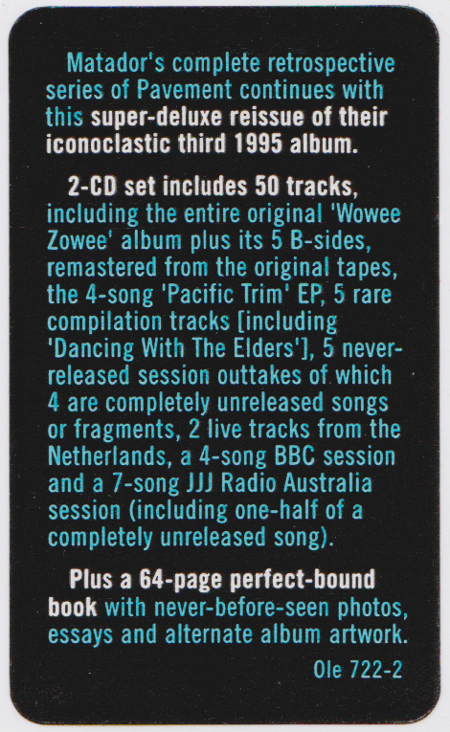
Pavement, Wowee Zowee
Originally released 1995, reissued 2006 (Discogs) with 32 bonus tracks
Undoubtedly, Wowee does not have the individual, single-worthy highlights of Crooked Rain. The songs that initially seemed to be the main attractions would not rank highly on most lists of Pavement's exemplary tracks, with the exceptions of, perhaps, ‘Rattled’, certainly ‘Father to a Sister of Thought’—the latter being uniquely a pretty, even exquisite, production by the band's standards. Besides these, the meat of the album can be said to include ‘Grounded’, ‘Grave Architecture’, the aforementioned ‘Fight’, ‘Half a Canyon’, and Kannberg's ‘Kennel District’. On ‘Grounded’, Malkmus and Kannberg as guitarists seem to be repeating themselves, exploring territory similar to what was heard on Crooked Rain's ‘Stop Breathing’. Nonetheless, all of those tracks exemplify the American version of Indie Rock that proved so elusive at the time, with many bands still so hooked on a heavy, murky guitar sound while others strived to do something different and make that difference obvious (Stereolab, Elephant Six bands, "post-Rock," "Electronica"-infused pop). Pavement's music at times possessed the forcefulness of heavier styles but on Wowee Zowee most of all they also subjected typical song structures and customary Rock sounds to a deconstructive process. So the rough, disemboweled tracks work about as well as those that hew more closely to convention. When, with Brighten the Corners, the band left the listener only with songs more complete in a standard fashion, they left them wanting more, even if some listeners did not realize it. Slanted and Crooked Rain may remain the go-to albums for new listeners. But Wowee Zowee, precisely because it is not a typical Pavement album, is their unlikely masterpiece. Some artists are supposed to be upset audiences' expectations, be contrarian. "Do your own thing" indeed.
–Justin J. Kaw, June 2021